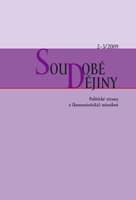Poněkud tradiční rozchod s minulostí Přítomnost minulosti v ideologii a politické rétorice Občanské demokratické strany
A Rather Traditional Break with the Past: The Presence of the Past in the Ideology and Political Rhetoric of the Civic Democratic Party
Author(s): Adéla GjuričováSubject(s): History
Published by: AV ČR - Akademie věd České republiky - Ústav pro soudobé dějiny
Summary/Abstract: The Civic Democratic Party (Občanska demokraticka strana) was founded in early 1991 with no historical predecessor. According to its founders it was founded ‘in spite of’ the tradition of Czech political thought, with reference only to Anglo-American political models. This article investigates whether these historical factors were truly absent, and, among other things, points to the veiled use of widely shared historical stereotypes in the popularization of the chosen variant of economic transformation. From the political crises of 1997 and 1998, when the right-of-centre governing coalition fell apart and the Social Democrats took power, Civic Democratic Party rhetoric linked up far more explicitly with Czech tradition and history. This trend came to a peak between 2000 and 2002, when the party no longer saw Czech national traditions and interests as being in conflict with the allegedly provincial thinking of the Czechs’ post-Communist neighbours, but rather in conflict with the structure and orientation of the European Union and the interests of Germany. In the second part of the article the author discusses how in the Civic Democratic Party the interpretation of ‘coming to terms with the Communist past’ was changed. She supports the view that this was not merely a matter of a short-term political instrumentalization of changes in mood in society or reactions to pressures from regional organizations and political opponents. Rather, she argues, it was a matter of a relatively consistent conception of the Communist past as an alien element in Czech history, which needed, as part of the idea of ‘breaking with the past’, to be driven out of its own tradition. This sort of conception leaves no room, however, for the weighing of guilt, the problematization of the categories of culprit and victim, or refl ections on one’s own responsibility.
Journal: Soudobé Dějiny
- Issue Year: XVI/2009
- Issue No: 02-03
- Page Range: 313-332
- Page Count: 30
- Language: Czech

